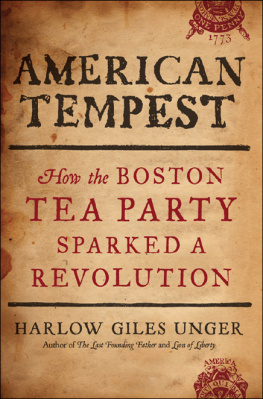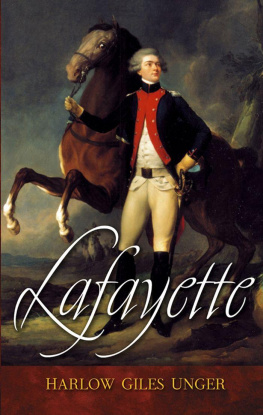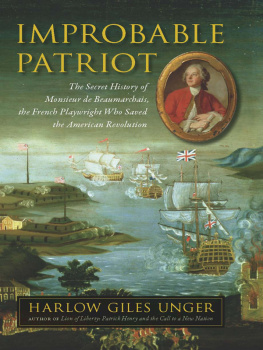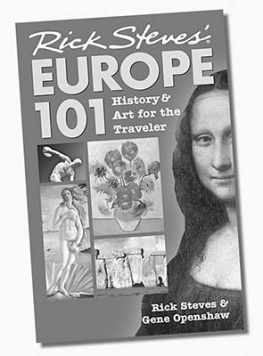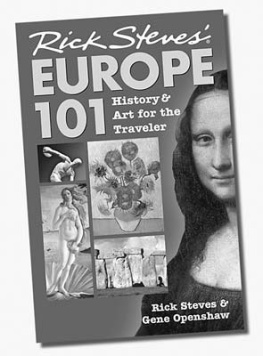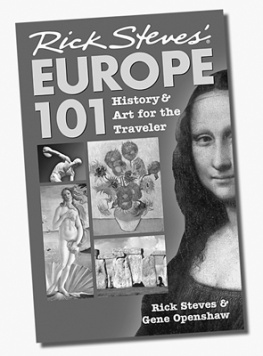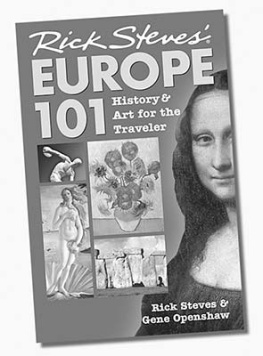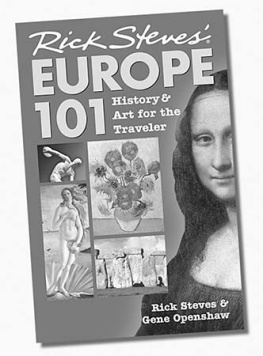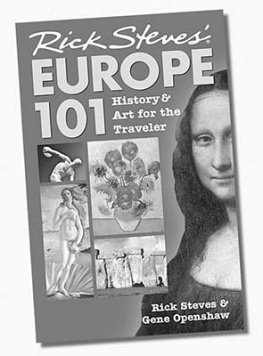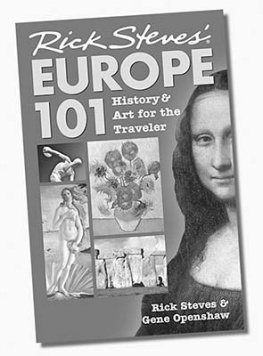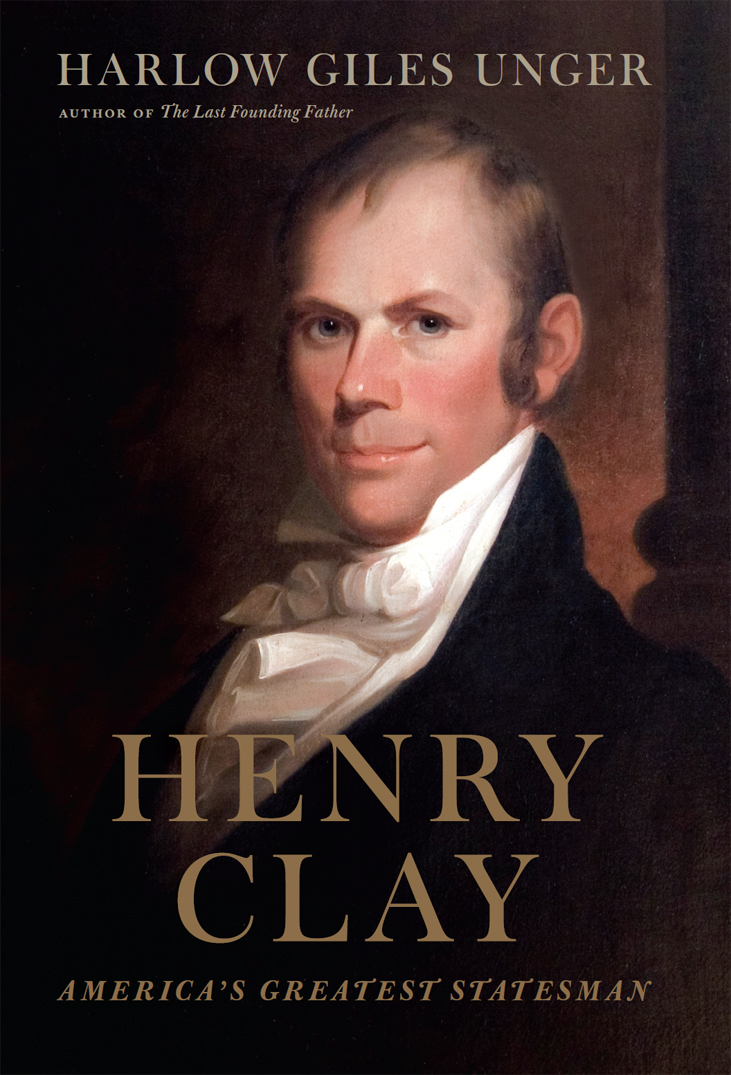

Copyright 2015 by Harlow Giles Unger
All rights reserved. No part of this publication may be reproduced, stored in a retrieval system, or transmitted, in any form or by any means, electronic, mechanical, photocopying, recording, or otherwise, without the prior written permission of the publisher. Printed in the United States of America. For information, address Da Capo Press, 44 Farnsworth Street, Third Floor, Boston, MA 02210.
Designed by Trish Wilkinson
Set in 11.5 point Adobe Garamond Pro
Library of Congress Cataloging-in-Publication Data
Unger, Harlow G., 1931
Henry Clay, Americas greatest statesman / Harlow Giles Unger.
pages cm
Includes bibliographical references and index.
ISBN 978-1-631-21192-8 (e-book)
1. Clay, Henry, 17771852. 2. LegislatorsUnited StatesBiography. 3. United States. CongressBiography. 4. United StatesPolitics and government18151861. I. Title.
E340.C6U57 2915
328.73092dc23
[B]
2015010250
First Da Capo Press hardcover edition 2015
First Da Capo Press paperback edition 2017
ISBN: 978-0-306-82516-3
Published by Da Capo Press
An imprint of Perseus Books, LLC,
A subsidiary of Hachette Book Group, Inc.
www.dacapopress.com
Da Capo Press books are available at special discounts for bulk purchases in the U.S. by corporations, institutions, and other organizations. For more information, please contact the Special Markets Department at Perseus Books, 2300 Chestnut Street, Suite 200, Philadelphia, PA 19103, or call (800) 810-4145, ext. 5000, or e-mail .
10 9 8 7 6 5 4 3 2 1

This Dust Was Once the Man
This dust was once the man, Gentle, plain, just and resolute, under whose cautious hand, Against the foulest crime in history known in any land or age Was saved the Union of these States.
WALT WHITMAN, 1871, BOOK XXII, LEAVES OF GRASS
Contents
List of
Illustrations
Introduction
Introduction
Blackguards,
Bankrupts, and Scoundrels
Double
Dealing
Guide
Maps
Illustrations
My deepest thanks to Eric Brooks, curator at Ashland, the Henry Clay home in Lexington, Kentucky, for the valuable materials and information he provided me and, above all, for sharing his vast knowledge of Clays life and times. My thanks as well to Robert Pigeon, a mentor and friend as well as executive editor at Da Capo Press of the Perseus Books Group. And although their names do not appear on the cover, the members of the wonderful publishing and editorial team at Da Capo Press are as responsible as I for this book. I am truly grateful for their help and honored by their support. In addition to Robert Pigeon, my thanks go to John Radziewicz, Publisher; Lissa Warren, Vice President, Director of Publicity; Kevin Hanover, Vice President, Director of Marketing; Sean Maher, Marketing Manager; Cisca Schreefel, Manager, Editorial Production; Justin Lovell, Editorial Assistant; Trish Wilkinson, Designer; and Josephine Mariea, Copy Editor. My warmest and most sincere thanks to you all and to the great sales team of the Perseus Books Group.
April 12, 1777Henry Clay born, Hanover County, Virginia.
1781Father dies; mother remarries a year later.
17851790Attends local log-cabin school.
17911792Clerks in Richmond.
17921796Reads law with Chancellor George Wythe.
1797Admitted to Virginia bar, moves to Kentucky.
1798Admitted to Kentucky bar.
1799Marries Lucretia Hart.
1800Daughter Henrietta born, first of six daughters, dies in 1801.
1802Son Theodore Wythe born, first of five boys.
1803Practices law in Lexington; elected to Kentucky legislature; son Thomas Hart born.
1805Named Professor of Law, Transylvania University, Lexington; daughter Susan Hart born.
1804Buys first part of Ashland plantation property; hired to defend Aaron Burr; fills unexpired term of US senator.
1807Reelected to state assembly; chosen speaker; daughter Anne Brown born.
1809Duel with Humphrey Marshall; fills unexpired term of US senator; daughter Lucretia Brown born.
1811Elected to US House of Representatives; elected Speaker of the US House of Representatives; son Henry Clay Jr. born.
1812Pressures President James Madison into war with Britain.
1813Daughter Eliza Brown born.
1814Serves on US Peace Commission, Ghent, Belgium.
1815Negotiates trade agreement with Britain; reelected House Speaker.
1816Helps found American Colonization Society; daughter Laura born, dies ten weeks later.
1817Calls for Latin America independence; son James Brown born.
1819Assails General Andrew Jackson in House speech.
18201821Engineers Missouri Compromise; resigns as Speaker; son John Morrison born.
1824Describes American System to bind the Union; loses presidential election.
1825Appointed US secretary of state; accused of corrupt bargain.
1826Duel with John Randolph of Roanoke.
1831Elected US senator; son Henry Jr. graduates second in West Point class; son Theodore committed to Lunatic Asylum of Kentucky.
1832Loses campaign for US presidency; engineers tariff compromise, averts South Carolina secession; leads censure of President Jackson.
1837Elected president of American Colonization Society.
1838Involved in deadly Cilley-Graves duel.
1840Assumes control of Senate; dubbed The Dictator; loses bid for presidential nomination.
1842Resigns from Senate; resumes private law practice with son James.
1844Loses US presidential election, despite support of Abraham Lincoln; opposes annexation of Texas.
1847Son Henry Jr. killed in Mexican War; bid for presidential nomination rejected.
1849Named US senator.
1850Engineers Compromise of 1850, prevents secession and civil war.
1851Resigns from Senate.
June 29, 1852Dies in Washington, DC; Lincoln delivers eulogy, embraces Clay policies.
THE CLAY FAMILY
Parents
Henry Clay, 17771852
Lucretia Clay, 17811864
Children
Henrietta, 18001801
Theodore, 18021870
Thomas Hart, 18031871
Susan Hart, 18051825
Anne Brown, 18071835
Lucretia Hart, 18091823
Henry Clay Jr., 18111847
Eliza, 18131825
Laura, 18161817
James Brown, 18171864
John Morrison, 18211887

Note: The author has modernized spellings, punctuation, grammar, and syntax in nineteenth-century letters, manuscripts, and publications cited in this book without knowingly altering the intent of the original author. Readers may find the original language, spellings, and punctuation in the works cited in the notes. Unless otherwise noted, illustrations were obtained from the Library of Congress or sources in the public domain.
O n November 4, 1811, a fearless young lawyer from Kentucky threw open the doors of Congress and, like Hercules at the Augean Stables, began to cleanse it of corruption and barbarism and prevent the fracture of the infant American republic. With bold rhetoric and sheer will over the next forty years, he sowed the seeds of nationalism, preserving and strengthening the Union and lighting the way for Abraham Lincoln to guide the American Union through the Civil War intact.


